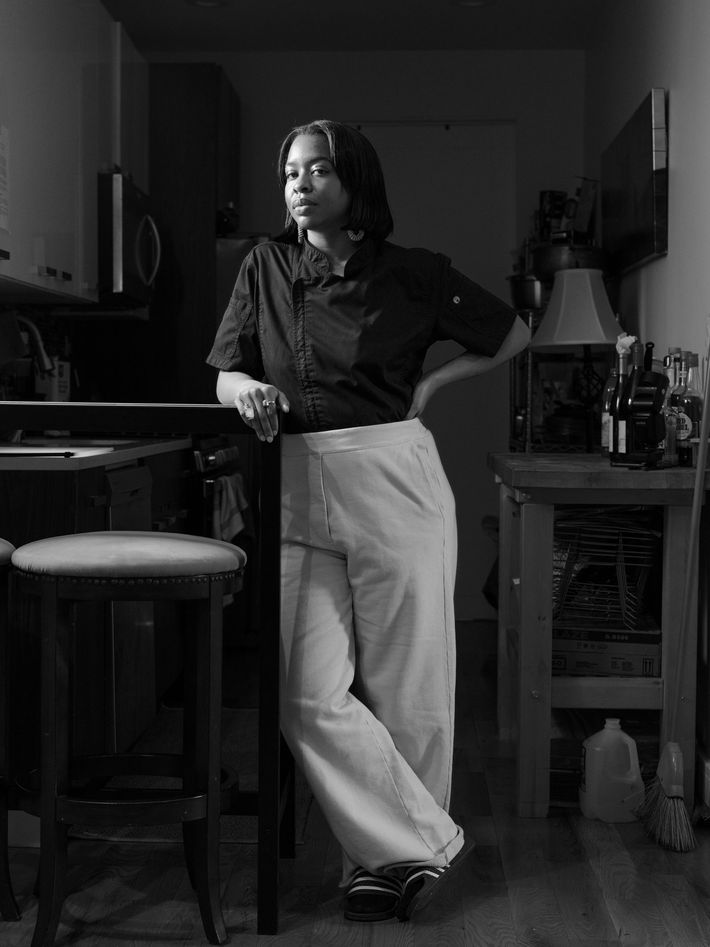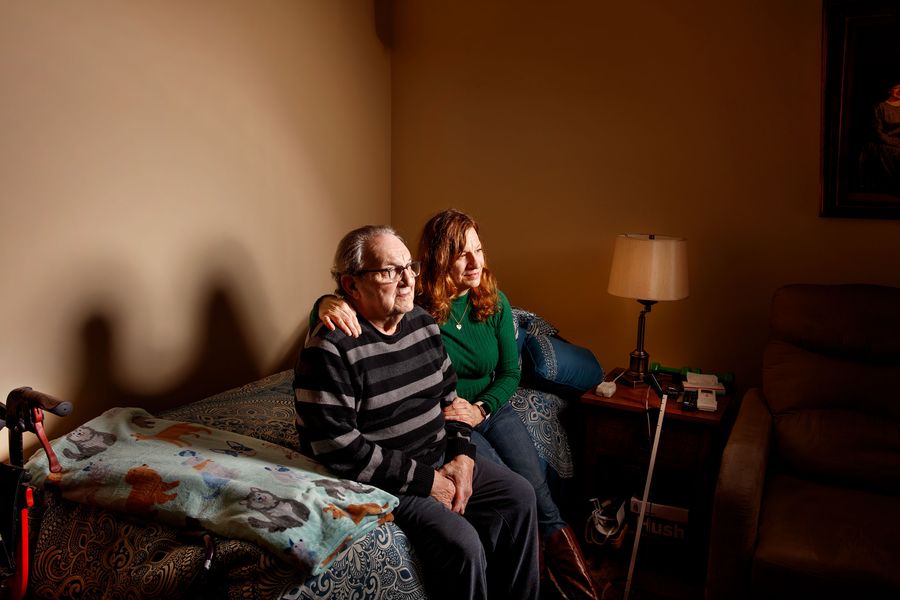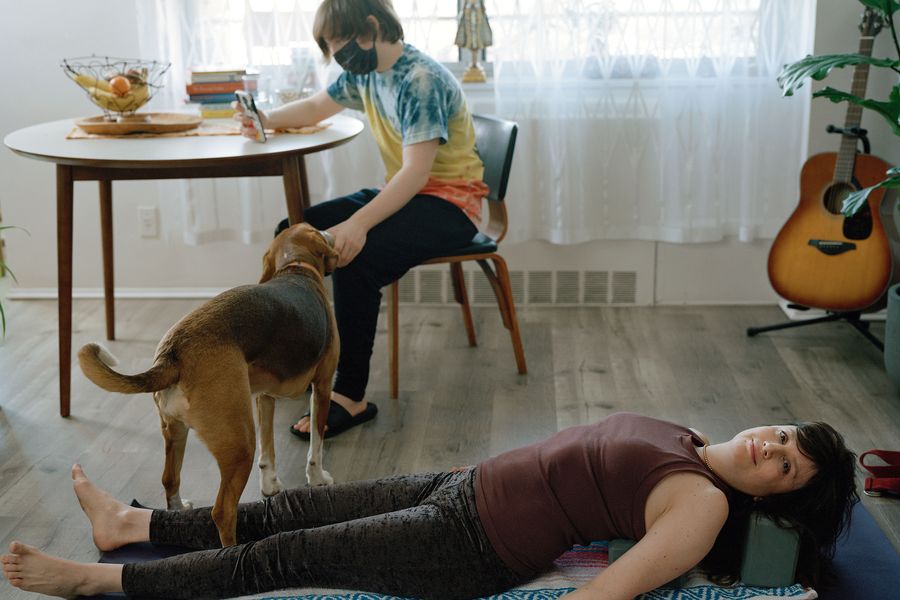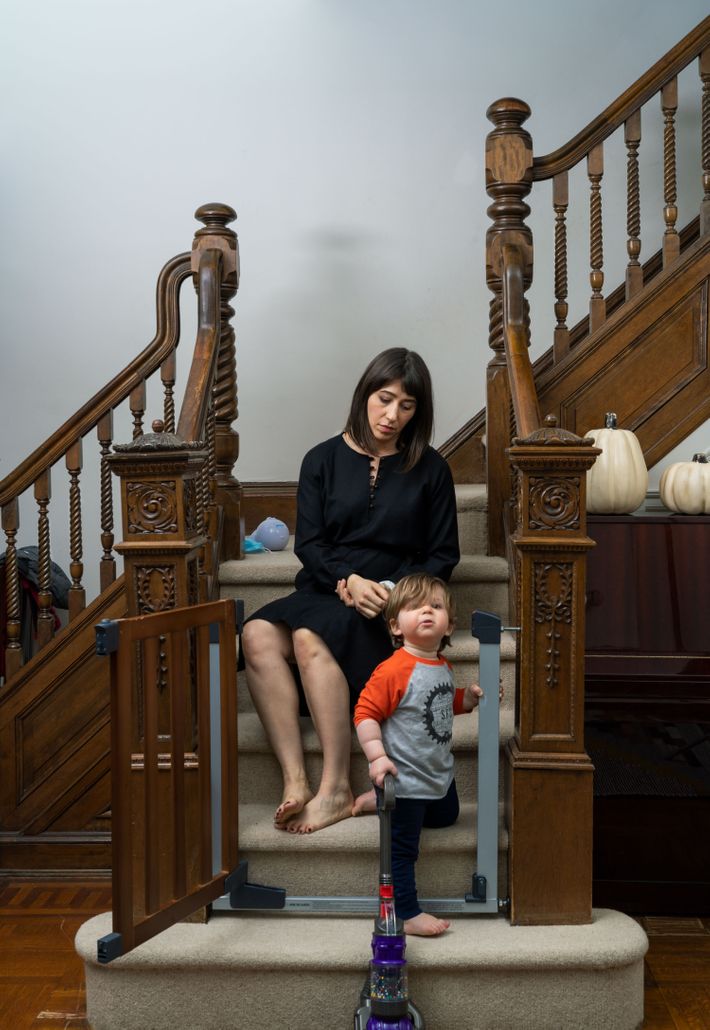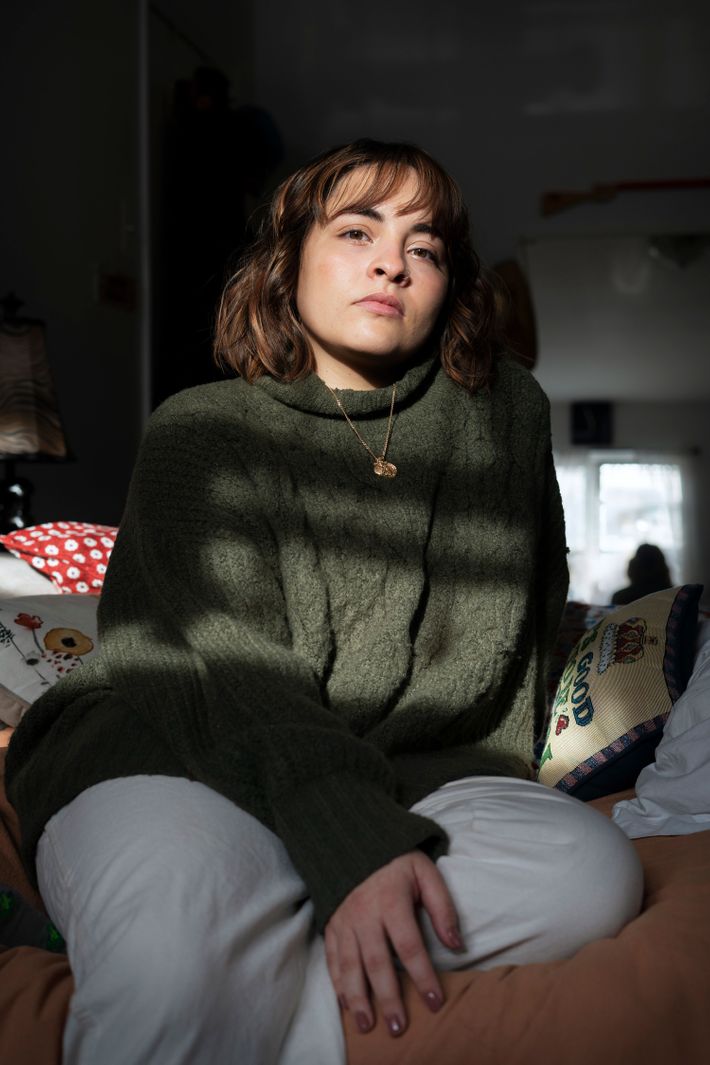Women have lost 5.4 million jobs since the pandemic began, accounting for more than half of all losses in the U.S. The damage to women’s employment has been catastrophic, particularly for women of color. When the world shut down, industries like hospitality and retail, which disproportionately employ women of color, were hit especially hard.
Not only are women’s jobs disappearing, but women are disappearing from workplaces by quitting. While the decision to step back may seem like a “choice,” many women — facing the increased domestic responsibilities that come with sick family members, day care closures, and virtual school — describe it as anything but.
The Cut spoke to thirteen women about how their lives and relationships to work have changed over the past year.
“I really wanted to stay there and work my way up.”
Shenarri Greens, 27, Brooklyn, chef
I had just started a new job as a line cook at P.S. Kitchen in Times Square — an all-vegan restaurant. Everything just stopped with very short notice. My hours were being cut. I couldn’t make a living working part-time. It was best for me to leave and try to find work elsewhere. The restaurant ended up closing just a week after I left. I felt a little uncertain of what to do next. I applied to a few places, then I decided I was going to do more freelance work as a private chef. I think this pandemic has definitely shifted a lot of our lives, but it’s also forced us to take a step back and just think. So it’s been kind of nice to spend some time with myself. I didn’t want it to happen this way, but I am grateful that I got the chance to know myself a bit better. It’s unfortunate that it took a pandemic, but here we are.
“Being pregnant does not save you when there are mass layoffs.”
Rachel Peace, 28, Brooklyn, public-relations specialist, mother of a 4-month-old
The only person who knew I was pregnant before we started working remotely was my immediate director, and she was supportive and wonderful. But then, at a certain point in the spring, the company suddenly let go of our international contractors. That was when I was like, Things are about to get real. So I put in writing very quickly, “Hey, I’m pregnant.” But being pregnant doesn’t save you when there are mass layoffs. We were furloughed in April and then laid off in August. I was due in October.
My company extended our health care for three months after termination, and I literally needed it for every single day because I ended up having horrible complications. Now I’m on a plan from the marketplace that’s $20 a month, and my son is on Medicaid.
I gave myself a maternity leave. I didn’t want my lack of a job to impact this early time with my son. But those three months are over now, and I feel the pressure. When it comes to finances, money is waning. I just started noodling around for jobs this week, and it is 100 percent overwhelming. I look for jobs at 2:30 in the morning, when I’m awake with my son.
“My supervisors gave me an ultimatum: Come in to work or be let go.”
Chanel Clark, 39, Atlanta, retail employee, mother of an 8-year-old
I’d been working at Macy’s for the past two years. At first, I was furloughed. Both my father and father-in-law passed away due to coronavirus, and my mother was hospitalized for several months, so I was taking this pandemic very seriously.
I was in a really bad place when they called me back to work, but I still went back because, at the time, my son, who has autism, was at a special-needs after-school camp that was very supportive and safe. But when the schools announced they would be closing and going 100 percent virtual, I told my employer I had to take a medical leave, and they agreed.
After a month, my supervisors gave me an ultimatum: Come in to work or be let go and have it considered “job abandonment.” If you abandon a job, you don’t get unemployment, and you also cannot get hired by any other affiliate stores.
It was crushing. You work for a company for two years, and they just do this? We’d been saving up for so long to become homeowners — that’s why we moved to Georgia — but we’ve had to use all our savings since I left work.
My husband’s working two jobs, and he can’t really be home with us. It’s very isolating being alone with my son, and he’s not getting any of his services because we don’t have the same income coming in. Still, in Georgia, we technically make too much money to qualify for state benefits.
“If I fall sick, I can’t take care of him.”
Faith Rashid, 57, Oyster Bay, New York, occupational therapist, mother of an adult child
At the end of February, one of my patients, she was very sick. They said, “She’s got a respiratory virus.” They closed the whole unit because they didn’t want the virus to spread. My dad was scheduled to have cancer surgery at the end of March. If I got sick, I’m going to expose him, and that can’t be happening. I was able to get eight weeks of paid family leave. After that, I left the job, and I’ve been home since then. My husband is the main earner in the house, so we’re okay. I’ll tell you the truth, I felt guilt. I knew that my co-workers were going through hell at work. I felt I was letting down my team. Now, my dad’s health issues have kept me busy. Being a caregiver, a lot of people might not think it’s essential like a nurse or a policeman, but we’re essential to their life.
“All we hear is screaming.”
Kalpana Patel, 43, Tampa, HR consultant, mother of five girls ages 8 to 14
In 2015, I started an HR consulting company. But with the pandemic, my daughters had to do homeschooling. The oldest two were capable of getting things on their own, but the younger three needed support. So I ended up having to let go of my clients.
Everyone has different needs and different moods, and a lot of them are having hormonal changes. You can imagine a bunch of girls in the house with just emotions all over the place. When school was virtual, they started at 7:45 a.m. with multiple breaks — which meant they constantly came down from their rooms and needed something. “This doesn’t work,” or “How do you do this?” It was chaotic. It literally feels like I’m this on-demand maid, cook, and laundry person. My husband and I, we don’t have time for each other. In the 18 years we’ve been together, I think we’ve fought the most over these past ten months.
The hardest day was when one of my 9-year-old twins had a moment. My husband was on a call with a client. At one point, the client was like, “Do you want to go? Is everything okay? All we hear is some screaming in the background.” My husband came out, and for the first time ever — he’s not a yeller — he yelled at the top of his lungs at her, “You need to calm down, I’m on a conference call with a client. This is very important.” I can still see his face. She was crying and screaming, and I was trying to get her upstairs into her room to contain that. She wouldn’t budge.
I broke down. I cried in the laundry room for a while because that’s my only space where I can shut the door and lock it and be like, “Don’t come in.” Then I came out, and I said, “All right. Everybody needs to sit down. I’m calling a family meeting.”
That conversation helped. Now I’m like, “You can do it — there’s no wrong way to do the laundry. I don’t really care if you mix the colors. What’s the worst that’s going to happen? I’m not going to be picky. I’m not going to yell. Load the dishwasher however you want; run it on a half-load if you have to. I don’t really care. Just do it.” I do miss working.
“My job provided no safety.”
Camilla*, 27, Oakland, McDonald’s night-shift worker, mother of three children ages 1½, 6, and 8
What happened first was that my baby displayed symptoms, and we both tested positive. Soon after, my partner and 8-year-old got sick. I knew I was going to get sick because my store did not provide us with any real PPE. They told us to use doggy diapers or coffee filters.
I wanted to continue working, but my job provided no safety. It was basically, You have to take a risk, and that’s on you. I’ve been home for eight months. We all live in a bedroom in a shared home, and having to take care of a baby while my 8-year-old does home-schooling has been nearly impossible.
I have a 6-year-old daughter back in Guatemala, and I haven’t been able to support her — it’s very hard to deal with that. We feel a lot of pressure covering the costs. The only support I’ve received is through community food programs and $500 in aid through an NGO. I’ve been looking for night-shift work so my partner can take care of my children when he’s not working, but it’s hard to find night-shift work that is also safe. I don’t know what I’m supposed to do.
“The stimulus money was very, very helpful.”
Christine Hackett, 49, East Village, set decorator, mother of a 16-year-old
I was furloughed from March to August. When I went back, we were tested every week and had daily temperature checks, but it seemed like I was taking too big of a chance in bringing anything home to my son, who has asthma. The show I was working on came to an end in late October, and I decided not to resume. Now I’m teaching yoga to a pod of three people. It’s been one of the best experiences I’ve ever had — coming together with others and having community during this time. I’ve realized I have choices. I thought I was locked into the industry until I retired. Having more time on your hands to use for a vision of your own is a real gift. There’s struggle, but there’s a lot of gratitude.
“Otherwise I will unleash the wrath.”
Seon-Hye Moon, 35, Davis, California, adjunct professor and Ph.D. student, mother of two children ages 5 and 7
Pre-pandemic, I was working 50 hours a week. I was slated to teach through last fall, but I realized I had to support the kids full-time. I had an incoming kindergartner in the fall, so instead of teaching three courses, I brought it down to one.
My husband, he just works. Until recently, we lived at my parents’ house, where my husband took up their bedroom, so he could work undisturbed. Now we’ve all moved, and he has his own office space. My husband has said, “If you could earn more than me, I would happily be the stay-at-home dad.” But he likes his work. He’s choosing this, and we are, in a way, supporting him.
There are moments that I have to just breathe. I definitely consume more alcohol than normal. I’m also at Target at nighttime a lot. I go two or three times a week. One is always for necessities, and the others are just to browse. That’s when my kids are asleep. No one’s attached to me.
When my husband and I were both working full-time, I would ask him to do stuff as soon as he got home, and he’d get frustrated. He was like, “I work too. I need to unwind too.” Now, he’ll do anything I ask. Otherwise I will unleash the wrath, because he knows everything that I do. I think it’s the realization that we enable him to focus on his work. There’s definitely an acceptance, plus an appreciation, which is different.
“I feel like I’m failing at everything I’m to do.”
Bethany Fauteux, 37, New Bedford, Massachusetts, line cook,mother of two children ages 7 and 13
Everything feels like it’s on shaky ground. I went from 40 or so hours a week of work to just ten hours. I’m a single mom, and my 7-year-old son is doing hybrid learning, so he’s not online only two days a week. My mom used to be able to help watch the kids, but a month into that, her health declined, so I have to take care of her, too. I have to take her to the hospital sometimes, and it’s getting to be a lot.
I feel like I’m just a letdown at work because I can’t commit to shifts. I don’t know when the school or hospital will call and I’ll have to leave mid-shift. I’m currently at a point where I might have to leave my job completely. If I quit, I don’t know if I’ll be welcomed back. I feel like I’m failing at everything I’m trying to do. Being a parent during all of this, being a good worker, being a good daughter — I’m trying my best, but I feel like I’m failing.
“By the time I would see a post, there were already 250 applicants.”
Kyle Hollingsworth, 54, Woodland Hills, California, a creative director for a Fox Sports division
I woke up that morning just expecting a checkup call. As soon as I heard “This is your last day,” I thought I was going to throw up. The primary feeling was just shock, which is funny because I knew the pandemic was affecting everyone. When it decides to personally come home to you, it wakes you up really starkly.
There were some days when I was filled with fear. I wasn’t entirely certain whether I was hirable in industries outside of sports. That had me feeling unsure about how to shape my résumé. By the time I would see a post, there were already 250 applicants. I made a decision to use the time off to revamp my website, revamp my résumé, and launch an art business. That’s the thing I’m actually delighted by — to see the number of women who have taken a crappy situation and said, “Screw it. I’m going to do my own thing.”
“Every place I know that had a choice between a male and a female manager brought back a male.”
Jennifer Davis, 37, Bethesda, Maryland, catering and special-events director
When our governor did the stay-at-home order, our restaurant was one of the only ones that closed completely and didn’t do takeout for the first month. Once they decided to open back up, it was a flat rate, like 50 bucks a day to come in and run their restaurant. They didn’t have any safety measures in place. It was a no-brainer.
I immediately started babysitting my niece and nephews, and my sister would pay me. It’s been so fun. You know, the food-service industry is one of those where you kind of have to be there all the time, so I missed birthday parties and trips and bridal showers. Weirdly, this whole time has given me the ability to spend more time with the people I love.
I’ve been applying for jobs since March 18 actively. Either I get no response or I had somebody set up a Zoom call once and just never show up. This is month, what, ten for me? And that was the first person that was interested in having a conversation. I called my mom and burst into tears, like, “What am I going to do?” I know it sounds silly, but I was like, “I’m going to be unemployed forever.”
My worst-case scenario is I don’t find a job before unemployment runs out. If I can’t go back to this type of work, I feel like I lose 20 years of experience and have to come in somewhere as entry level. That’s crazy to me. I’m way closer to having to take an entry-level job in a field I’ve never worked in than I am to getting back to where I was. For one, female managers in restaurants and bars are not very common. Typically, a male is promoted within, or they’ll bring in a man from outside. And the man is always paid more, regardless of experience. I do know of restaurants where the male managers were asked to come back and the female ones were not. Every place I know of that had a choice between a male and a female manager brought back the male, regardless of quality of work.
“I knew he needed to work and I needed to take care of the kids.”
Allison Yarrow, 38, Brooklyn, author, mother of three children ages 1, 4, and 6
When New York City locked down, I was home with my three kids without any child care for three months. Before the pandemic, I had sold a book proposal. I did a lot of paid speaking. Sometimes there would be a month when I would get on six airplanes to fly around and go speak. I was developing a podcast; I was working on a series of videos with another collaborator. My day was pretty set nine to five. That all ground to a halt. Sometimes I worry that it’s a career setback, but other times I remember that this is the entire world going through it. Women, we blame ourselves for problems that we see as individual when they’re actually structural.
“Early on, I was upset that I wasn’t prepared to work in a hospital. I was thinking, If only I were already ready to be working. Knowing that’s what I wanted to do, and I couldn’t do it, during a time that has been so crazy — it was
Elisabeth Fuentes, 24, Bushwick, waitress
In January, before the pandemic hit, I left my job at a nonprofit where I’d been working for two years. I was pre-med in college, and I needed to start looking for work in a hospital so I could have some hospital experience under my belt. So I was in an in-between place; I was working as a waitress at a Japanese restaurant in Manhattan. And then everything shut down.
I was definitely freaking out. Thank God, I had some money saved. I immediately signed up for unemployment, and I was receiving the additional $600, so it wasn’t horrible. I went back to work when they reopened indoor dining in September. But it was only for about a month, and then I was around somebody who had COVID. You’re supposed to quarantine for two weeks, so that’s what I did — and they replaced me. It sounds so shitty, but I understand: It’s a business. Restaurants have had it really rough, especially in New York. They need to stay open.
*Names with an asterisk have been changed at the request of the subject.
*This article appears in the February 1, 2021, issue of New York Magazine. Subscribe Now!


